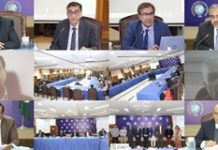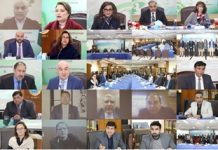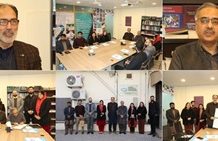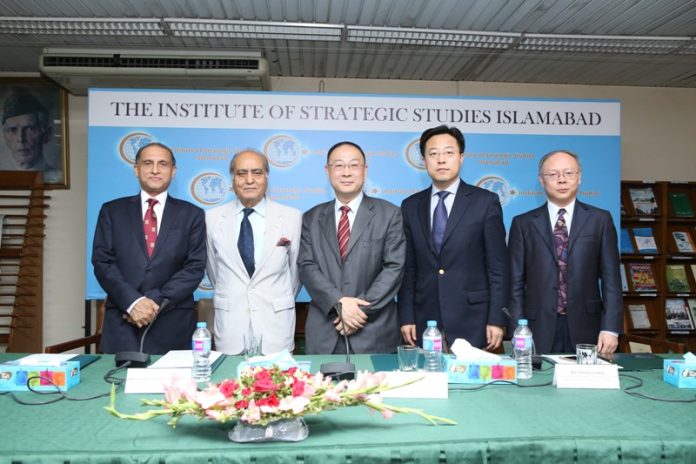PRESS RELEASE
Public Talk
on
“China’s Foreign Policy After the 19th National Congress of CPC and its International Relations in the 21st Century”
Institute of Strategic Studies Islamabad
June 26, 2018
“The most important thing for any country is to modernize itself and hence command its own destiny” – this was stated by Professor Jin Canrong, Professor and Associate Dean at the School of International Studies, Renmin University, Beijing during his address at a Public Talk on “China’s Foreign Policy After the 19th National Congress of Communist Party of China (CPC) and its International Relations in the 21st Century.” The talk was organised by the Institute of Strategic Studies Islamabad (ISSI) on June 26 under its Distinguished Lecture Series.
Mr. You Yi, the Cultural Counsellor at the Embassy of the People’s Republic of China and Mr. Lijian Zhao, the Chinese Deputy Head of Mission at the Embassy of the People’s Republic of China also graced the occasion.
In his welcome remarks, Chairman ISSI, Ambassador Khalid Mahmood spoke about how China’s continuous rise and simultaneous national rejuvenation focuses on the need to maintain an open global economy that allows China to maintain its economic development. The new theme advocated by the Party Congress calls for a stronger commitment to safeguarding China’s sovereignty. At the same time it stresses on greater power diplomacy with Chinese characteristics and demands for new greater power relations based on mutual respect where each power recognizes the core national interest of the other power. Beijing is already following these principles through initiatives particularly in its neighborhood. Ambassador Mahmood further noted that in an era of Trump-led disruptions, China’s policies are in sharp contrast to the US’s protectionist and interventionist strategies. China is behaving as a responsible actor, favors communication over confrontation and focuses on the establishment of a community of shared destiny for all of humanity.
Speaking about China’s foreign policy and strategy, Professor Canrong said that the secret behind the rise of the West is that western countries command the manufacturing industry. Presently, China has the largest manufacturing industry in the world- it surpassed the United States in 2010. The role of China’s great revolution is significant as the social structure in the country has changed – the society is more egalitarian, he noted, which is also a requirement of a machine-based society.
He went on to explain how any new country experiences three stages: survival, development and dignity. For China the Mao Zedong era was vying for the survival of New China (PRC), and the Deng Xiaoping era was focused on pursuing economic development. Currently, the Xi Jinping era is seeking dignity by shaping a major power strategy with Chinese characteristics and embracing a new identity from a regional power to a world power. China’s foreign policy framework has always encompassed big powers, its neighborhood, the developing world and international organizations. In the present era it also includes public diplomacy, global governance and protecting overseas interests.
He said that since President Xi Jinping came into power, China has become more active globally, and is trying to establish a mechanism for cooperation by increasing spending on aid development, poverty relief and climate change. While the US wants hierarchy, China wants equality. Its way of global governance is UN centered and it puts development first. As a result, it seeks equal partnership and has a staunch principle of non-intervention.
Director General ISSI, Ambassador Aizaz Ahmad Chaudhry, in his concluding remarks, appreciated China’s policy of major power diplomacy. He was of the view that the Chinese have reaffirmed belief in UN charter principles. In sharp contrast to US policy makers, China wants to advocate greater power diplomacy, an open economy and globalization as opposed to protectionist policies. He also said that unless one has the requisite power, any confrontational threats ring hollow and thus before embarking on tough talks one should put their house in order – which is what China has done.













